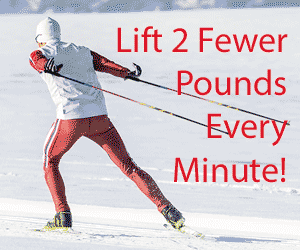
Lake Placid Update - with video
Kris Freeman
Thu, Oct 9, 2008 - By Zach Caldwell
Last year Kris had a great Lake Placid camp, but he came in on shaky footing. He had done a hard intensity training block during September, and it was too much. While that block, alone, wasn’t the source of his difficulties last season, it sure didn’t help his stability. Kris took a rest prior to the Lake Placid camp and recovered quite well from the overload. When he got to Lake Placid he was running very hot, and had an extremely impressive camp - it was probably his best fitness of the year, competition season included.
This year Kris has come in off a moderate intensity load. To qualify that statement it’s worth point out that a moderate intensity load includes a 30 hour week since he got home from Whistler in mid September. But there has been no intensity, and the focus has been on moderation and good judgement. Things have gone well since the poor end to the September Whistler camp.
Saturday the team did their regular double-pole intervals. The format is two sets of 3X4 minutes, with each interval getting a bit fast - turning into a real head to head contest by the end of the workout. For Kris we were looking for about 15 minutes of race-pace effort, and so his instructions were to sit-in on the pack and not push the pace early on under any circumstances. Kris has not problem making a session like that much harder than we wanted it to be. The reason for the conservative approach is that we’re looking for the right kind of load as a lead-up to a full race effort. As it turned out, Kris’s HR for the first two DP intervals was 135 and 136. I was travelling East at the time, and got a text message in the Vancouver airport from Pete saying that he would have to be turned-loose in the second half. While I didn’t witness it first-hand, I’m told that he put on an impressive display. Pete’s next text message reported that the session was going “smashingly”.
Sunday was an easy day - sandwiched between Saturday’s interval session and today’s Whiteface rollerski race. So Kris and Noah Hoffman took an easy run up Mt Marcy. Maybe that’s not an easy run for most of us, but for those guys it’s under 3 hours without much hurrying, to it qualifies. Incidentally, they did the run seven or eight minutes faster than they did in a similar session last year, in spite of several inches of snow on the top of Marcy.
That brings us to today - the Whiteface rollerski race. Kris was impressive in this event last year. He was beat by Duncan Douglas who is exceedingly good at a sustained uphill effort like this, and also has some pretty fast rollerskis. Unfortunately the course was changed at the last minute this year because snow at the top of Whiteface made it impossible to take the race all the way to the top. So they moved both the start and the finish down a mile and a half or so, but the race also ended up being a bit shorter than last year’s edition. Duncan was there again - and was once again in great shape and skiing on fast skis (I would love to see those two go head to head on a climb like this on evenly matched skis). Those guys skied away from the field from the gun, and Kris drafted (there was a bit of a headwind) Duncan for the first five minutes or so, until Duncan put down a bit of a move on a flatter section where he was able to throw in some V2-alternate. From there Kris held the gap steady for a while, and then lost time gradually to the finish, ending up about 15 seconds closer to Duncan than last year. Duncan’s assessment was that he was going significantly better than last year (he might have estimated something like half a K per hour), and Kris felt much more positive than last year as well. He put his HR at 180 within the first mile, and held it there for the rest of the race. Last year he was getting himself into trouble at a HR over about 172, which is probably a solid indication of some level of suppression.
Insulin dosing went well today, and continued to underline the lessons we’ve already learned. These sustained maximal hill-climb efforts are the most demanding efforts Kris can make in terms of insulin need. He used the dosing strategy that we developed during the last Whistler camp, bringing his basal dose on the Omnipod up to 1.0 units/hour one hour before the start, and then taking it up to 3.0 ten minutes prior to the start. 3.0 units/hour is the highest dose he’s ever used. By comparison, a “high” dose during a race effort last year would have been equivalent to about 0.6 unit’s per hour on the Omnipod. Still, even with the very high dose, Kris finished the 34 minute effort with his blood sugar at 213. Not dangerously high, and not to the level that Kris feels his performance is compromised, but certainly not low. Finishing lactate was 8.1, which is on the high side for such a long sustained effort for Kris - in-line with his sustained high HR.
All things told the numbers and the look of today’s effort is among the best of what I’ve seen from Kris - at least equivalent to the Whistler 30 time trial from July (although it’s difficult to compare a 30K on rolling terrain with a sustained 34 minute hillclimb). Kris and Pete and I had a very productive meeting at lunch after the race, going over plans and strategies for the first period. While Kris is entering the season in a much, much better state of health and stability than he was last year, we still need to work hard to ensure that there is no repeat of last season’s instability and illness.
So - things are looking good for Kris. Very good. He’s now returning to a volume focus. He’ll do some light bounding natural intervals during the next couple of weeks, and then will finish this next block with the Dartmouth Ski Team Mt Moosilauke hillclimb before heading down to NYC to visit Julie and take a short recovery period at the end of October. Then he’ll start building volume again prior to a November 9th departure for Europe. The plan is to have Kris travel in a state of gathering momentum and training load - the mos positive and stable state that he can find himself in. We definitely don’t want him to travel while he’s trying to recover from overload. The map ahead is clear and the route is simple - now it’s a matter of staying on the road.
Reprinted with permission from the Kris Freeman website at http://www.krisfreeman.net/. Copyright © Zach Caldwell and Kris Freeman

